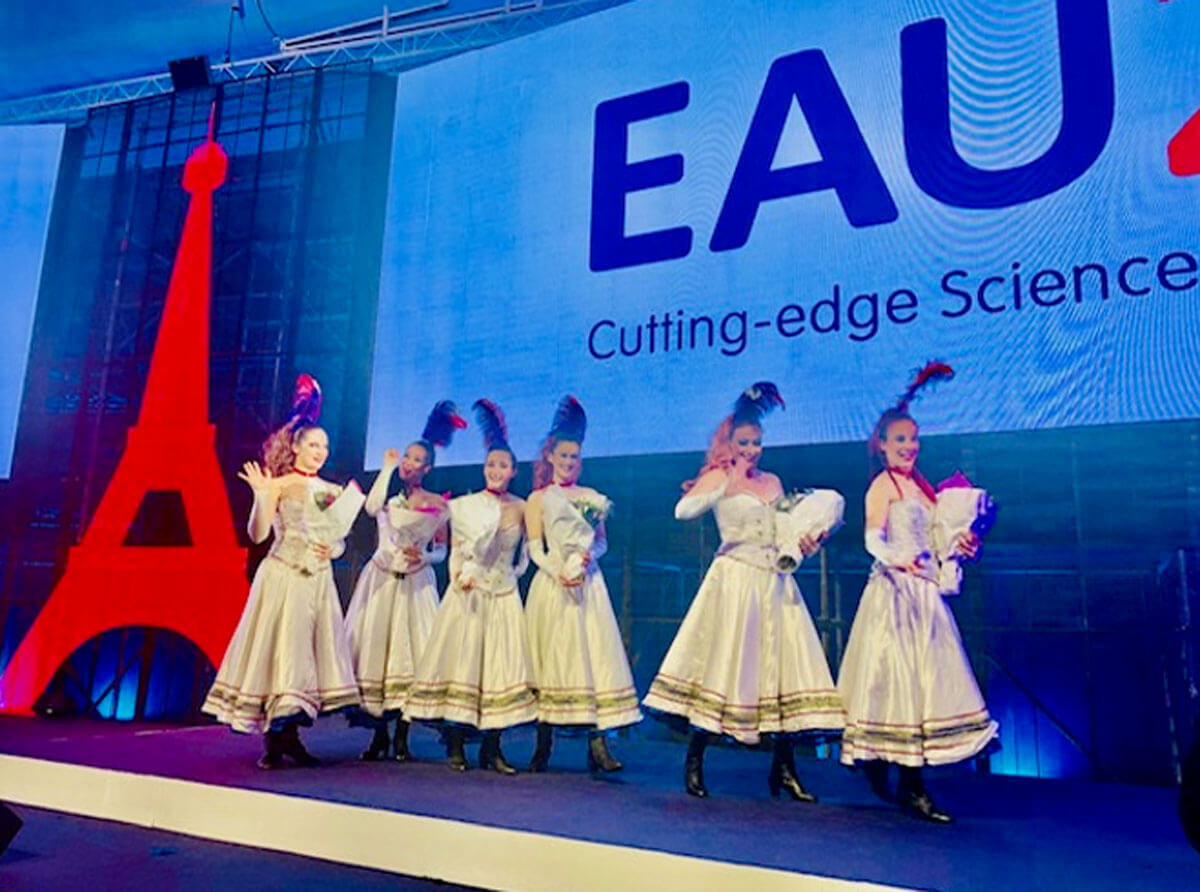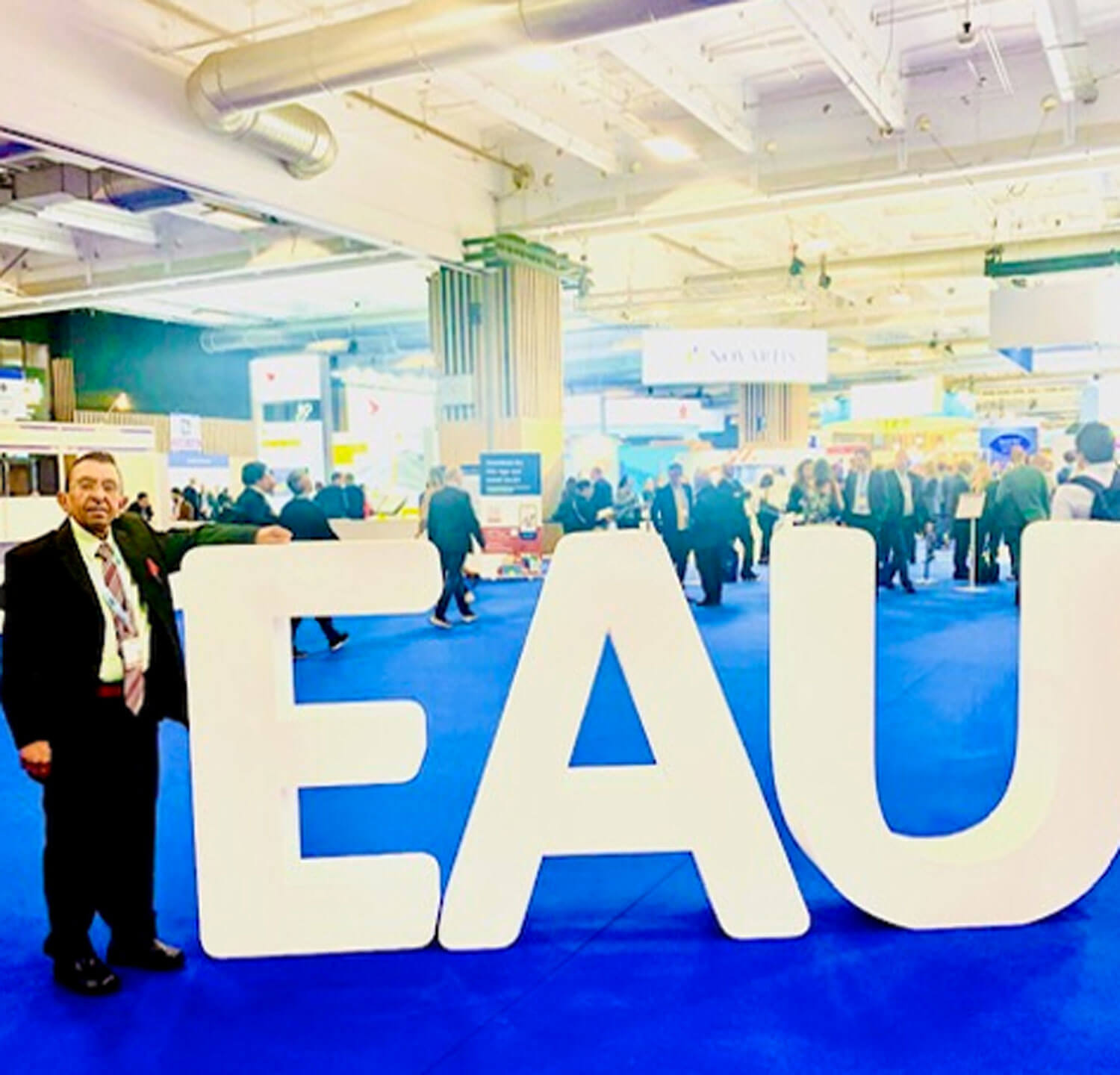By Arun Sharma, Urologist, West Herts NHS Teaching, Trust Watford, UK.
The 2024 Annual EAU meeting was held at the Expo Porte de Versailles in Paris, the 'city of lights'. The opening ceremony was full of razzmatazz and included breath-taking performances by cabaret artists. Delegates were welcomed by EAU Secretary General Professor Arnulf Stenzl, who introduced the congress motto of providing ‘cutting-edge science’. An impressive 9000 face-to-face delegates registered with many more attending virtually. This highlighted the importance of hybrid participation, with over 5000 abstracts submitted from across the globe.

After the opening ceremony, the awards and prize session followed. This began with Prof Stenzl introducing two new EAU honorary members: Professor Hassan Abol-Enein from Egypt and Professor Jens Rassweiler from Austria. The prestigious Willy Gregoir Medal for significant contribution to urology in Europe was awarded to Nicolas Mottet from France, in particular for recognition of his work on the EAU Guidelines. Professor Chris Chapple (Sheffield, UK) received the Frans Debruyne Lifetime Achievement Award for his significant and enduring contributions made to the activities and growth of the EAU (he was Secretary General for eight years). The Ernest Desnos Prize was received by Johan Mattelaar (Belgium) for his extraordinary contribution to the history of urology. Erik Briers, also from Belgium, received the Patient Advocacy Medal of Excellence, while the Crystal Matula Award (sponsored by Laborie) for a young European urologist went to Giorgio Gandaglia from Milan. The EAU conference highlighted the vast and limitless ocean of knowledge and learning involved in the field of urology. My personal highlights were:
1) The plenary session on complications was very informative and a real eye-opener, with the common saying ‘to err is human’ being emphasised, i.e., the only urologist who never gets complications is one who never operates in theatre. Vascular or any other major injury during robotic surgery should be dealt with by prompt open conversion. The other topics presented were ureteric avulsion / perforation during ureteroscopy (URS), lasers for stones, and rectal injury during pelvic surgery.
2) Genetic basis of stone disease - monogenic versus polygenic factors.
3) Predictive accuracy of stone measurement (PRAISE).
4) Role of betmiga vs. solifenacin for overactive bladder in children. Betmiga treatment had greater treatment response (94%) vs. solifenacin (72%).
5) Urothelial dysfunction in radiation cystitis and recurrent UTI. Management for these patients is often complex. There was a very detailed session from The Netherlands on the scientific basis of glycosaminoglycan (GAG) layer replacement therapy. The agents are classified as - sulphated (chondroitin or heparin), unsulphated (hyaluronic acid) and synthetic (pentosan).
6) Robot-assisted URS and intra-renal surgery (RIRS).
7) How safe is URS for stones - beware of intrarenal pressure / heat generation / high energy.
8) Erectile dysfunction therapy - new techniques e.g., intracavernosal injection of platelet rich plasma, etc.
9) PROFERTIL® to improve sperm parameters for male infertility.
10) Novel therapeutic agents in prostate cancer e.g., abiraterone, enzalutamide and apalutamide which will be increasingly used.
EAU 2024 hosted a huge exhibition area – it was like our very own urological theme park! One could spend all day exploring the stalls. Many exhibitors presented their products in interesting and interactive ways. Lunchtime seminars and evening breakout sessions were very educational, encompassing recent guidelines and updates on standard of care. This was also a good opportunity for networking with colleagues and forming new friendships. I met and interviewed delegates from the USA, Canada, Germany, India and Israel and sparked discussions around the ever-changing face of urology in developing countries. I also met colleagues from Spain, Denmark, Sweden, Brazil, South Korea, and Eastern Europe. There was the opportunity to visit the AUA and SIU stands and also to hear about the progress of the European School of Urology.
My visit to the History Section was fascinating. Before the French Revolution there was no healthcare system in France. Physical care was the responsibility of nuns and priests. The concept was ‘Christus Medicus' – referring to Christ as the physician of both the body and the soul. Following the Revolution some revolutionaries themselves became uro-genital surgeons. The forerunner in uro-anatomy and surgery was Ambroise Pare (1510-1590). He was a surgeon to four French Kings and devised instruments for bladder stones and urethral strictures. Jean Guyon (1831-1920) became the first professor of urology, started the 'service d’urologie' in Paris and wrote many texts and books, pioneering translational research. The concept of the EAU was born in Paris around 1972 and it continues to go from strength to strength.
Overall, EAU 2024 was a great success. Goodbye for now, until we meet again… Au Revoir!

SAVE THE DATE
EAU Annual Congress 2025
21–24 March 2025
Madrid, Spain
https://uroweb.org/education-events/40th-annual-eau-congress



